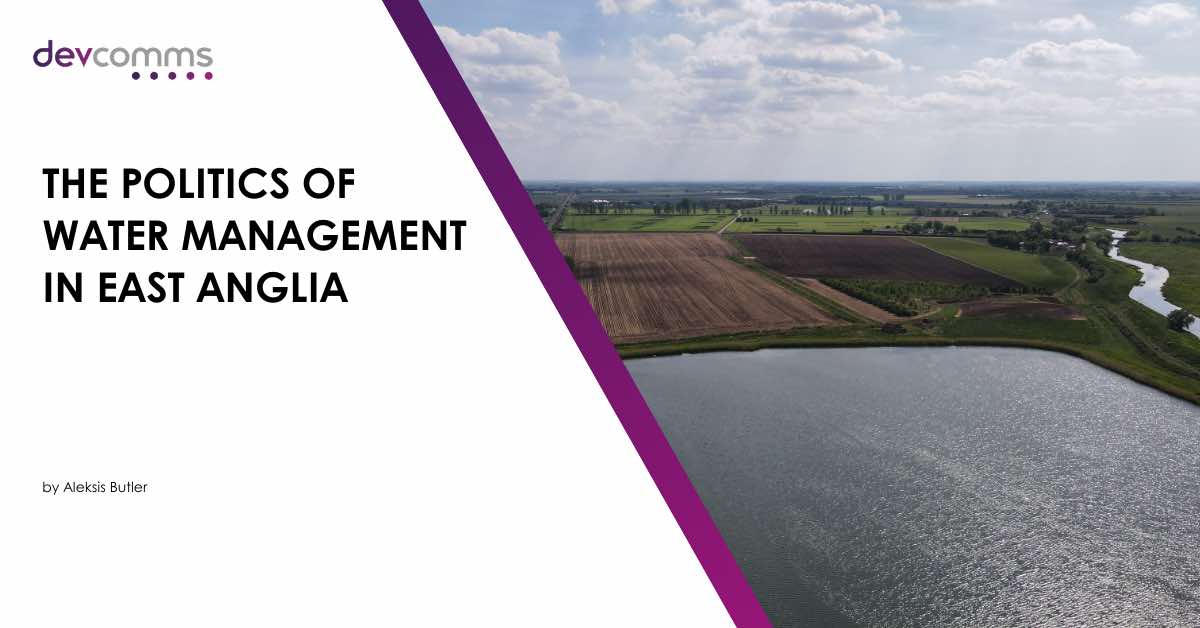DevComms senior account executive Aleksis Butler considers the route to effectively managing water security in East Anglia and its competing interests and priorities.
Water is a lifeline for East Anglia, a region renowned for its vast agricultural lands, delicate ecosystems, and growing urban centres.
Yet, managing this vital resource has become one of the most contentious political issues facing the area today. With some of the lowest rainfall levels in the UK and one of the highest demands for water, East Anglia is at the frontline of a growing water crisis.
Farmers need it for irrigation, residents rely on it for daily life, and developers are increasingly aware of the role water access plays in unlocking new housing and employment opportunities.
East Anglia, with its flat landscapes and agricultural dominance, has been grappling with water scarcity for years. The region receives some of the lowest annual rainfall in the UK, and when rain does arrive, it’s often at the wrong time or in excessive amounts, leading to flooding rather than replenishment.
The 2022 drought, one of the most severe in recent UK history, underscored vulnerabilities in local water supplies and highlighted the direct impact on development potential, as water scarcity becomes a bottleneck for new projects.
A critical example of this intersection between water management and development is the proposed Cambridge Waste Water Treatment plant relocation by Anglian Water.
This project aims to create a modern, low-carbon facility that not only meets the growing water treatment needs of Greater Cambridge but also supports the development of a new low-carbon city district on Cambridge’s last major brownfield site, known as North East Cambridge.
The relocation will unlock 8,350 homes, 15,000 jobs, and a range of community and cultural facilities, demonstrating how critical water infrastructure is to regional growth.
At the heart of East Anglia’s water challenges are multiple stakeholders — each with their own priorities and often conflicting interests. For developers, the critical issue is how water infrastructure constraints can hinder growth, particularly in housing and employment sectors.
The Cambridge Waste Water Treatment development serves as a prime example: it’s not just about relocating an old facility, but about enabling sustainable growth by integrating advanced technology to recycle water and nutrients, produce green energy, and reduce environmental impacts.
However, developers often find themselves caught between the demands of agriculture, which relies heavily on water for irrigation, and environmentalists, who push for stricter water usage controls to protect rivers and ecosystems.
The relocation of the waste water treatment facility has faced opposition from groups like Save Honey Hill, who argue that moving the plant to arable farmland in the Green Belt constitutes a ‘crime against our environment’. This tension between necessary infrastructure for development and community and environmental concerns exemplifies the complex landscape of water politics in East Anglia.
Water companies, such as Anglian Water, are under pressure to balance these competing needs while also addressing infrastructure shortcomings. Recent fines from Ofwat for environmental violations have only intensified scrutiny, raising questions about the companies’ ability to support new developments without compromising on service delivery or environmental commitments.
Despite these challenges, Anglian Water maintains that the new facility will be operationally net zero carbon, enhance resilience to storm flows and flooding, and improve water quality in the River Cam.
Water management in East Anglia reflects broader national debates on environmental policy, infrastructure investment, and regulatory oversight. Political parties play a significant role in shaping these debates, with different approaches to balancing development and environmental protection.
For instance, local Suffolk MPs, including Adrian Ramsay (Green Party, Waveney Valley) and Jenny Riddell-Carpenter (Labour, Suffolk Coastal), have been vocal about the need for stricter environmental safeguards, often clashing with pro-development stances that favour loosening restrictions to expedite housing projects.
The Labour Government’s Planning and Infrastructure Bill, which aims to streamline infrastructure projects like the Cambridge Waste Water Treatment plant, is intended to enhance water security and support development. Yet, these projects often encounter resistance due to concerns over their environmental impact and the displacement of agricultural activities.
The scale of the essential infrastructure needed to ensure the long-term resilience of waste water treatment capacity in Greater Cambridge inevitably means impacts will be felt, a reality that Anglian Water acknowledges as it seeks to balance growth with community concerns.
For developers, the path forward in East Anglia involves not only navigating these political waters but also actively engaging in dialogue with all stakeholders. Success hinges on collaboration — bringing together farmers, water companies, environmentalists, and local authorities to find solutions that address everyone’s needs.
This includes advocating for investments in modern water infrastructure, such as the Cambridge Waste Water Treatment development, which directly supports new housing and employment projects.
In addition to infrastructure, innovation in water management practices, such as advanced irrigation systems, rewilding initiatives, and community-led conservation efforts, can play a crucial role in addressing water scarcity without halting development. By fostering a culture of conservation and sustainable use, East Anglia can demonstrate how progress and preservation can go hand in hand.
Ultimately, the politics of water management in East Anglia are a microcosm of the challenges faced nationwide: balancing development needs with environmental stewardship in a climate of scarce resources. If East Anglia can navigate these complex waters and strike a balance between competing demands, it could set a precedent for water management across the UK.
By embracing collaboration, innovative solutions, and a nuanced approach to party politics, the region can show that even in the driest of places, a shared commitment to sustainable water use can unlock future growth and prosperity.
© Eastern Echo (powered by ukpropertyforums.com).
Sign up to receive our weekly free journal, The Forum here.












